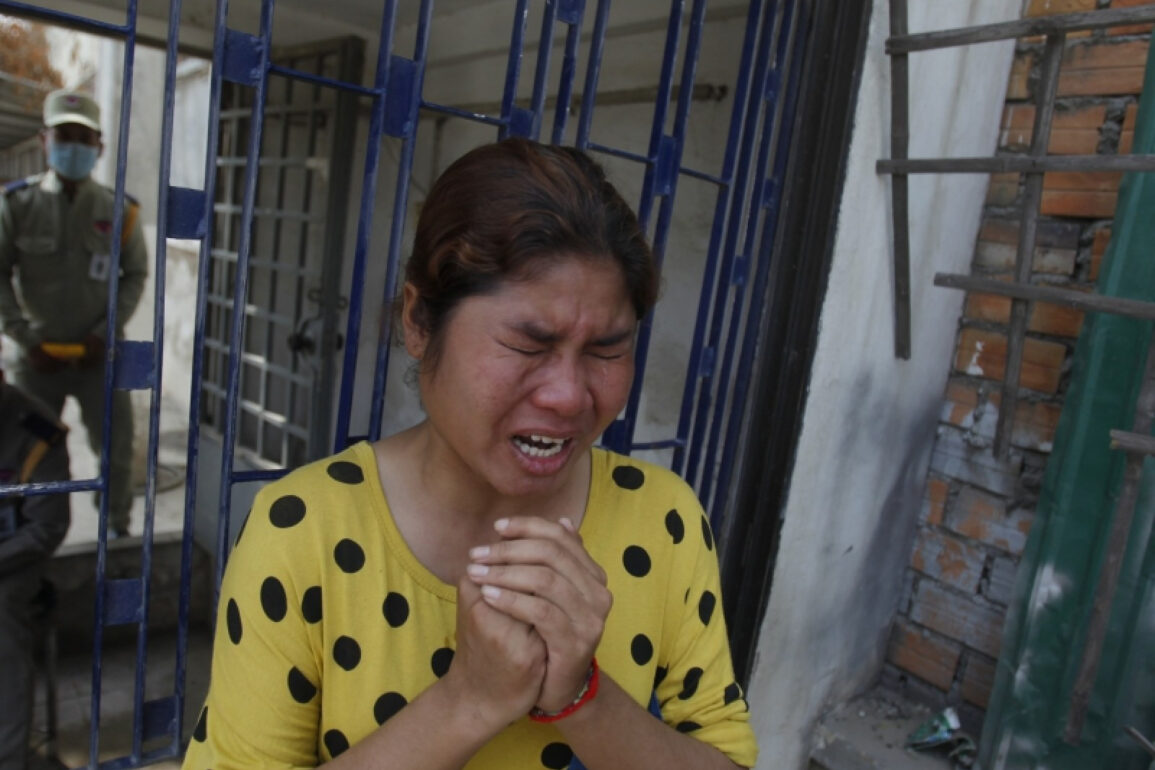
A number of inmates, interviewed after release, paint a disturbing picture of abuse, coercion and slave labour in Cambodian women’s prison CC2.
Retail giants, Walmart and Centric Brands, have initiated an investigation into their supply chains in Cambodia amidst accusations of use of prison slavery. An investigation, that unearthed worrying trends, by Reuters and a US industry group sparked at the reaction from the retail giants. Inmates housed in the country’s largest women’s prison have been employed illegally, manufacturing clothing ready for export to the United States. Labelled as ‘part of a rehabilitation programme’, women essentially coerced in a manner of ways to make garments.
Other retail giants have recently found themselves in hot water over similar allegations. Last November, the American Apparel and Footwear Association (AAFA) wrote to the Cambodian ambassador of the U.S, Keo Chhea, expressing “strong concerns regarding credible reports” that inmates at Correctional Centre 2 (CP2) were producing textiles and garments for export as part of a rehabilitation programme.
The trade of goods across borders, manufactured by convicted criminals and prisoners is illegal in both the U.S and Cambodia. The ILO (International Labour Organisation) only allows prison labour if inmates freely consent to the work.
Sok Sopheak, the Secretary for the Cambodian Ministry of Commerce, chaired a committee investigating the allegations expressed by the AAFA. In a conversation with Reuters, Sopheak revealed that Cambodia had imposed fines on three local businesses, who also had their export licenses suspended for employing CC2 inmates for the production of hotel slippers destined for the EU and Japan. The total product had a value of around $190 000.
In February, the Office of the United Nations High Commissioner for Human Rights (OHCHR) confirmed that it had conducted a visit to CC2 and it had engaged with the relevant authorities regarding the presence of forced labour in the centre. As a result of the investigations, the workshops operating within the prison were halted temporarily.
Four individuals, among them two former CC2 inmates, had disclosed that items produced in the prisons seemed to have connections with Walmart and Centric Brands, the licensing partner for the likes of IZOD, Calvin Klein, Tommy Hilfiger, and Under Armour. These accusations stem from the identification of branded materials, like Walmart shopping bags and IZOD branded polo shirts, inside the prison itself. In response, both corporations instigated the investigations into their supply chains.
“We find the allegations very concerning”, a spokesperson from Walmart stated in early June. “Forced labour of any kind is abhorrent, and we believe all people should be treated with dignity and not be exploited”. The spokesperson confirmed that the investigation was ongoing as of mid-August.
Similarly, in June, Centric revealed they had “placed on hold” its imports from a factory in Cambodia, and asserted their commitment to immediately “terminate connections” with any supplier found to be using prison labour. An update earlier in the month said they have “not found any evidence supporting the claim that prison was used” to make the mentioned polo shirt. However, Centric Brands ended their association with the factory thereafter.
As both companies distance themselves from prison production and halt importations, there has been little discussion about the conditions which many of these women are working. Based on Reuters’ investigation and interviews with four women who were released as recently as January this year, after serving sentences lasting up to two years, they were interviewed and relayed the abhorrent conditions, prison labour and coercive environment of CC2.
“We didn’t want to work but we had to work”. When we were in the prison we were equal to zero” said one former inmate.
The inmates worked standard hours and manufactured everything from trousers and shirts, hotel slippers, reusable shopping bags and a plethora of other items. Notably, Cambodia mandates a minimum monthly wage of $200 for its garment workforce. Of course, in CC2, this was not respected. The women shared that they frequently received a meagre compensation ranging from $1.75 to $5 per month. Layering on suffering, inmates refusing to participate were subject to various forms of coercion. From being moved around the prison arbitrarily to being forced to kneel for extended periods as punishment, refusal to participate in labour meant further dehumanisation.
Each of the former inmates attested that they relied on their factory earnings to cover a range of essential expenses including cell cleaning, electricity, fans, water, laundry detergent, sanitary pads, and even supplementary food. In addition, three out of the four women revealed that they were never given or shown employment contracts. Employment selection processes were more impromptu. Prison guards would simply record inmates names before their adding them to shift-rotas. Beyond the coercive nature of employment inside of a detention facility, the rather lacklustre employment process indicates an even worse reality. The complete lack of formal agreement only serves to further prove exploitation accusations. Additionally, it obliterates any potential for scrutiny due to lack of written records. Addressing this, an ILO spokesperson emphasised that if a prisoner chooses not to engage in labour, it is incumbent upon the government to guarantee that they are shielded from threats or punitive actions.
“A good indication of whether prisoners freely consent to work is whether the conditions of employment approximate those of a free labour relationship” the spokesperson said.
In light of these pressing concerns, impACT International underlines the paramount importance of a thorough and expeditious investigation into the myriad human rights abuse allegations embedded within Cambodian supply chains. The need for investigatory bodies to delve deeply into available evidence and pivotal witness testimonies is underscored, accompanied by the provision of a secure and confidential environment that shields their identities.
As prominent entities within their respective markets, both Walmart and Centric Brands bear a substantial responsibility to proactively guarantee their suppliers, regardless of location, adhere rigorously to the fundamental principles outlined by the ILO. Whilst it may be naive to suggest that these companies embody these principles, they are profit making entities and it is unlikely that companies such as Walmart will thoroughly investigate possible instances of human rights abuses in their subcontractor facilities. Whilst prison labour is available for multinationals, it is likely that they will exploit it.
impACT International therefore, calls upon Cambodian authorities to urgently address the immediate concerns at hand. A resolute stance is needed to extinguish the scourge of forced prison labour and the associated penalties for non-compliance. Beyond this, authorities must also improve prison conditions and reduce the likelihood of prison authorities using basic human items as leverage for labour
Beyond this, authorities must do more to improve prison conditions in order to reduce inmate exposure to coercion. Prison authorities and factory management are more likely to be able to engage in forced production if the prison itself leaves inmates with much to do in order to assure their survival inside. Using basic items vital for comfortable living as leverage is a vital cog in this process, only through prison improvements, ensuring inmate safety that forced labour will decrease in Cambodia. The imperative action is essential in upholding the dignity and rights of these individuals.
This post was originally published on this site be sure to check out more of their content.







